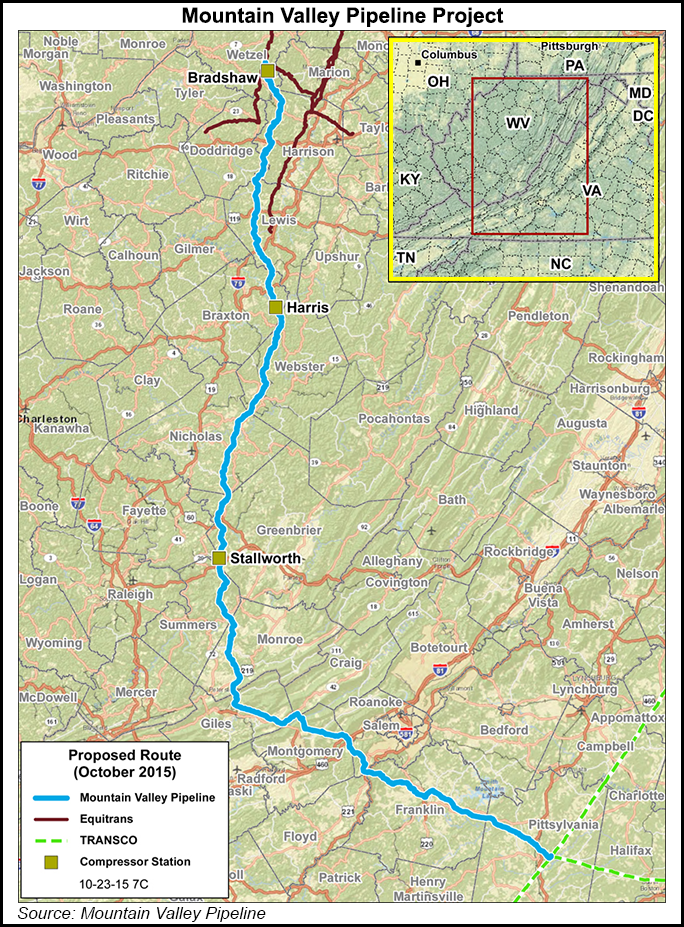Marcellus | E&P | NGI All News Access | Regulatory | Utica Shale
PennEast, MVP Pipeline Projects Again Hit Roadblocks
Two major natural gas pipeline projects that would serve robust shale production in the Appalachian Basin and have faced significant setbacks in recent years were again stymied last week.

Both the Mountain Valley Pipeline and PennEast Pipeline projects are facing further delays with the latest developments.
The U.S. Court of Appeals for the Fourth Circuit has stayed key federal authorizations for MVP, which is again likely to halt nearly all construction along the project’s 300-mile route.
Environmental groups had asked for a stay of the U.S. Fish and Wildlife Service’s (USFWS) Endangered Species Act approvals for the project while the court reviews a broader challenge to them. The Biological Opinion (BO) and Incidental Take Statement (ITS) are needed for the 2 Bcf/d project’s federal certification, and without them, it can’t proceed.
But the court also granted USFWS’s cross-motion to suspend the environmental group’s case until the agency can revise and reissue the BO and ITS, which the agency expects to do by January. The groups would again be able to seek judicial review of the revised approvals, but that would require an entirely different case to be initiated, ClearView Energy Partners LLC said in a note to clients.
The environmental groups, including Wild Virginia and the Sierra Club, filed a petition for review of the BO and ITS in August. Shortly after the filing, MVP voluntarily suspended construction activities where work could imperil federally listed species or risk modifying their habitats.
The groups argued that the USFWS failed to protect the endangered Roanoke logperch. The groups also claimed that the agency didn’t set limits for the number of threatened or endangered bats that could be harmed or killed by the pipeline’s construction, an argument that caused problems for the similarly routed Atlantic Coast Pipeline (ACP).
The Fourth Circuit vacated ACP’s BO and ITS on two separate occasions, finding that USFWS failed to set clear limits for the project, which led to work stoppages.
MVP, which would move more Appalachian shale gas to Southeast markets, has been targeting a mid-2020 in-service date. It is more than 85% complete, but the project has faced repeated regulatory and legal delays.
Virginia fined the pipeline $2.15 million last week and required it to conduct additional monitoring and implement more environmental protections after hundreds of water protection violations.
Meanwhile, The New Jersey Department of Environmental Protection (DEP) again denied a water quality certification (WQC) and other key permits for PennEast.
Without the approvals, the project can not move forward. DEP’s decision is the latest setback for PennEast and is likely to further delay progress on the 1 Bcf/d pipeline that’s been in the works for about five years to move more Appalachian shale gas to Pennsylvania and New Jersey.
The agency cited a ruling last month by the U.S. Court of Appeals for the Third Circuit that prevents PennEast from condemning state-owned land in New Jersey. The court concluded that the Eleventh Amendment of the U.S. Constitution bars a pipeline certificated by FERC from bringing an action in federal court under the Natural Gas Act to seize property a state owns.
Given the ruling, DEP said PennEast no longer has the legal authority to perform activities on more than 40 parcels of state-owned land along the project right-of-way. Therefore, the agency said its water quality application cannot be deemed “administratively complete.”
DEP had deemed the WQC application incomplete last month, asking the company to submit more information and address deficiencies, which it did.
PennEast found contradictions in the agency’s Oct. 8 denial letter. The company noted that while DEP deemed the previously identified deficiencies in the application to be sufficient, the agency still found the application administratively incomplete.
The company claimed in its own correspondence to the agency after the denial was issued that DEP failed to act on the application within the time period allowed under state law. PennEast also claimed in its letter that the Third Circuit’s decision “has no bearing on application completeness,” adding that its FERC certificate alone gives it legal authority over the route.
PennEast obtained Federal Energy Regulatory Commission approval for the project in January 2018 and promptly sued the state to condemn the land. New Jersey sought dismissal of PennEast’s complaint for lack of jurisdiction, citing the Eleventh Amendment of the U.S. Constitution, which recognizes that states have sovereign immunity from lawsuits by private parties in federal court.
Project sponsors have already asked FERC to issue a declaratory order clarifying the eminent domain authority pipeline developers have to condemn all land necessary for a project. Such an order, PennEast said in its petition, would help guide the courts through further proceedings.
“PennEast is confident the legal actions will be resolved favorably and the long-standing legal precedent under which FERC has operated to bring needed, clean, reliable and affordable energy to consumers will be upheld,” project spokesperson Patrica Kornick said. She added that the pipeline’s sponsors remain firmly committed to the project.
The agency closed its environmental review of the project and denied the application over incomplete information about two years ago, as well. New Jersey has largely resisted the project, having also asked FERC last year to scrap its certificate. About one-third of the 120-mile pipeline would be in New Jersey’s Hunterdon and Mercer counties.
Democratic Gov. Phil Murphy said on Twitter last week that his “administration fought and won in court to stop” PennEast. He also noted a draft plan unveiled over the summer aimed at transitioning the state to 100% alternative energy.
© 2024 Natural Gas Intelligence. All rights reserved.
ISSN © 2577-9877 | ISSN © 2158-8023 |
